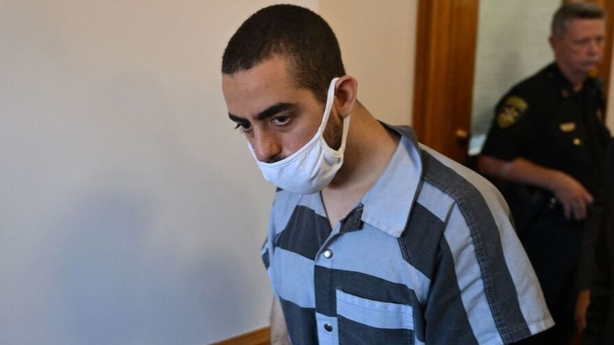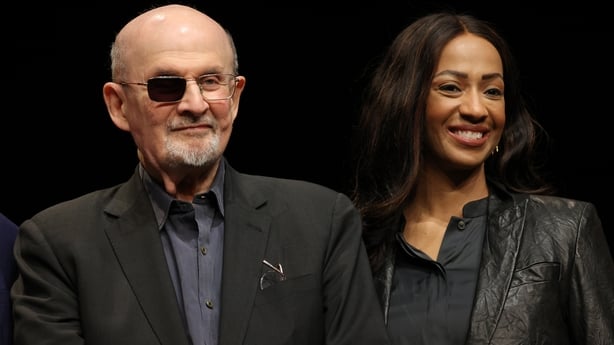Author Salman Rushdie has described the moment a man stormed on stage in the United States and attempted to kill him in an attack that left him blind in one eye.
The 77-year-old told the trial of US-Lebanese citizen Hadi Matar that the 23-year-old "was stabbing and slashing" at him.
"I was aware of this person rushing at me on my right hand side," he said, recounting how he was about to speak at an arts event in New York state in August 2022.
"I only saw him at the last minute. It was a stab wound in my eye, intensely painful, after that I was screaming because of the pain."
Mr Rushdie added: It "occurred to me I was dying" before he was stretchered out of the cultural centre and taken by helicopter to hospital.
The New York-based British-American was accompanied to court by his wife Rachel Eliza Griffiths.
Mr Matar's legal team has sought to prevent witnesses from characterising the author as a victim of persecution following Iran's 1989 fatwa calling for his murder over supposed blasphemy in 'The Satanic Verses' book.
The defendant is accused of stabbing Mr Rushdie about 10 times with a knife.
As he did yesterday - the trial's opening day - Mr Matar said: "Palestine will be free" as he was led into court.
He did not react as the novelist began his evidence, biting his nails during the testimony.

Mr Rushdie described his treatment and current health.
"The injuries were very serious and it took a long time to recover ... the gash (in my neck) was so deep it had to be held together with metal staples," he said.
Mr Matar previously told media that he had only read two pages of 'The Satanic Verses' but believed its writer had "attacked Islam".
Venue employee Jordan Steves explained to the court yesterday how he launched himself "with my right shoulder with as much force as I could manage" to help others subdue the attacker.
He pointed to Mr Matar when asked to identify who was responsible.
A colleague of Mr Steves, Deborah Moore Kushmaul, said she picked up the discarded knife and gave it to police.
The optical nerve of Mr Rushdie's right eye was severed and he told the court that he had to undergo "quite a painful operation - which I don't recommend".
He described the intensity of the pain of the attack, as "a 10" out of 10.
His Adam's apple was also partially lacerated and his liver and small bowel penetrated.
"The first thing I said on regaining the ability of speech was 'I can speak'," Mr Rushdie said to stifled laughter from jurors.
"How do you squeeze toothpaste onto a toothbrush with only one hand?" he asked when questioned about hand injuries he received as he tried to defend himself.

Mr Rushdie lived in seclusion in London for a decade after the 1989 fatwa, but for the past 20 years - until the attack - he lived relatively normally in New York.
He became the centre of a fierce tug-of-war between free speech advocates and those who insisted that insulting religion, particularly Islam, was unacceptable in any circumstances.
Last year, he published a memoir called 'Knife' in which he recounted the near-death experience.
One of Mr Matar's lawyers, Lynn Schaffer, said that prosecutors would seek to present the case as "open and shut" but warned that police had made assumptions about her client.
The accused reportedly became more withdrawn and militant in his outlook following a 2018 trip to the Middle East.
Iran-backed Lebanese militant organsation Hezbollah endorsed the fatwa, the FBI said, and Mr Matar faces a separate prosecution in federal court on terrorism charges.
Iran has denied any link to the attacker and said that only Mr Rushdie was to blame for the attack.

